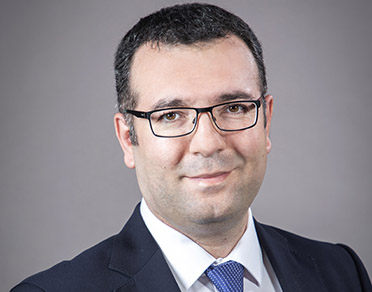Cybersecurity Professor Named Research Fellow by the National Association of Insurance Commissioners
By Mike Nolan
ALBANY, N.Y. (April 25, 2024) — Unal Tatar, an assistant professor at the College of Emergency Preparedness, Homeland Security and Cybersecurity, has been selected for the National Association of Insurance Commissioners (NAIC) Research Fellows Program.
The NAIC Research Fellows Program is intended to foster new and innovative research in insurance regulation by providing resources to researchers working in the field. Fellows are named for one year and given a stipend and access to relevant NAIC data and materials.
Tatar, whose primary expertise is in the economics of cybersecurity and risk management, will focus his program research on response strategies for catastrophic cyber risks.
“The NAIC is a major player in regulating insurance in the United States,” said Gary Ackerman, an associate professor and associate dean for research at CEHC. “Over the next 12 months, Dr. Tatar will be researching catastrophic cyber risk and insurance, which is both a challenge and an incredible opportunity. Having access to NAIC’s resources, such as their data and network, is going to be invaluable for his work. We can’t wait to see what models and insights he’ll be able to develop with these resources.”
“This fellowship is a milestone in my research career, allowing me to contribute to a critical area of insurance regulation,” said Tatar. “It represents an opportunity to impact policy and practices in a way that could help mitigate the risks associated with catastrophic cyber events, enhancing the security and economic stability of society.”
With more than 20 years of experience in cyber risk analysis and management, Tatar previously served as the head of Turkey’s National Computer Emergency Response Team. His tenure also includes the role of academic advisor at NATO’s Center of Excellence Defense Against Terrorism, specializing in cybersecurity and risk management, and a fellowship with the National Science Foundation Cybersecurity Center of Excellence.
At UAlbany, Tatar teaches undergraduate and graduate courses in cybersecurity. He’s also the principal investigator of a $1.5 million virtual institute supported by the Griffis Institute, a nonprofit talent and technology accelerator for the U.S. Department of Defense, that aims to train the next generation of cybersecurity professionals for future military and civilian leadership positions.
Catastrophic cyber risks are defined as incidents that cause severe loss, injury, or property damage to a large population. While rare, there is an increasing risk due to advances in complex technologies, such as artificial intelligence.
Through the fellowship, Tatar plans to explore insurance coverage options for such events and strategies to mitigate financial and infrastructural impacts.
“Over the next 12 months, I’ll aim to provide a deeper understanding of the insurance landscape for catastrophic cyber events, enhance strategies for cyber resilience, assess the need for federal insurance responses, and identify effective mitigation strategies,” Tatar said. “The goal is to contribute valuable insights that can guide policymakers, regulators, and industry leaders.”
Tatar is one of two research fellows joining NAIC’s Center for Insurance Policy and Research in 2024. To complete the program, he will produce a report and share takeaways at a national insurance conference.





